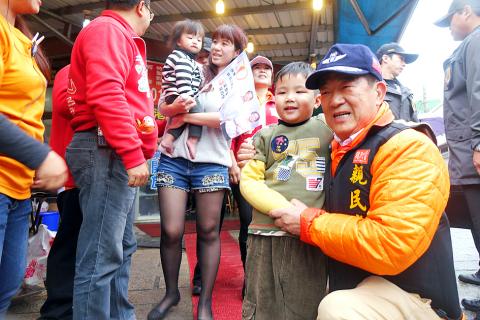Disregarding a mist of rain as well as a cold front, People First Party (PFP) presidential candidate James Soong (宋楚瑜) was yesterday determined to do all in his power to canvass votes for the PFP and its legislative candidates.
Earlier yesterday morning, during a campaign stop at the Lugang Tianhou Temple in Changhua County’s Lugang Township (鹿港), Soong accepted every opportunity to sign his autograph and have his photograph taken with supporters in order to promote his party and presidential bid.
Soong said that he was the safest presidential choice for Taiwan and that citizens could rest assured that if he were elected president, cross-strait conflict would not resume and Taiwan would retain its democratic liberties.

Photo: Liu Hsiao-hsin, Taipei Times
Soong also revealed that he had been contacted by the US government and that he would also receive a visit from US officials.
He said that the nation must let the US know that it would stay on the middle path by electing a stable and solid head of state.
“Such a leader would play a role in maintaining the careful balance existing between the US, Japan and China, as well as offering to be a buffer,” Soong said.
He said that by “buffer” he meant that Taiwan would be an anchor in terms of geopolitics, adding that it should also act as a buffer against time and change.
The ongoing changes in China cannot assuage Taiwanese concerns, Soong said, adding that this concern is why Taiwan should maintain its status as a free democracy.
When asked about the 18 parties vying for voters’ support in the legislator-at-large vote, Soong said he was confident the PFP’s votes would not be scattered.
However, the number of competing political parties highlights problems in Taiwan’s political system, Soong said.
The Chinese National Party (KMT) and the Democratic Progressive Party should not overshadow the plurality of opinions in Taiwanese society, Soong said, adding that should he be elected into office, he would seek to negotiate with the heads of the parties.
There are many aspects in the current system that should be tweaked, he said.
Later yesterday, Soong headed to Beidou Township (北斗) to campaign alongside PFP legislative candidate Chen Chao-jung (陳朝容).
Both men stuck to their campaign plan, despite heavy rain during the last leg of the event.
Soong wrapped up the night with a large rally in Taipei, touting his competence and administrative experiences as a leader of state who is able to hold the steering wheel steadily.

AGING: As of last month, people aged 65 or older accounted for 20.06 percent of the total population and the number of couples who got married fell by 18,685 from 2024 Taiwan has surpassed South Korea as the country least willing to have children, with an annual crude birthrate of 4.62 per 1,000 people, Ministry of the Interior data showed yesterday. The nation was previously ranked the second-lowest country in terms of total fertility rate, or the average number of children a woman has in her lifetime. However, South Korea’s fertility rate began to recover from 2023, with total fertility rate rising from 0.72 and estimated to reach 0.82 to 0.85 by last year, and the crude birthrate projected at 6.7 per 1,000 people. Japan’s crude birthrate was projected to fall below six,

Conflict with Taiwan could leave China with “massive economic disruption, catastrophic military losses, significant social unrest, and devastating sanctions,” a US think tank said in a report released on Monday. The German Marshall Fund released a report titled If China Attacks Taiwan: The Consequences for China of “Minor Conflict” and “Major War” Scenarios. The report details the “massive” economic, military, social and international costs to China in the event of a minor conflict or major war with Taiwan, estimating that the Chinese People’s Liberation Army (PLA) could sustain losses of more than half of its active-duty ground forces, including 100,000 troops. Understanding Chinese

US President Donald Trump in an interview with the New York Times published on Thursday said that “it’s up to” Chinese President Xi Jinping (習近平) what China does on Taiwan, but that he would be “very unhappy” with a change in the “status quo.” “He [Xi] considers it to be a part of China, and that’s up to him what he’s going to be doing, but I’ve expressed to him that I would be very unhappy if he did that, and I don’t think he’ll do that. I hope he doesn’t do that,” Trump said. Trump made the comments in the context

SELF-DEFENSE: Tokyo has accelerated its spending goal and its defense minister said the nation needs to discuss whether it should develop nuclear-powered submarines China is ramping up objections to what it sees as Japan’s desire to acquire nuclear weapons, despite Tokyo’s longstanding renunciation of such arms, deepening another fissure in the two neighbors’ increasingly tense ties. In what appears to be a concerted effort, China’s foreign and defense ministries issued statements on Thursday condemning alleged remilitarism efforts by Tokyo. The remarks came as two of the country’s top think tanks jointly issued a 29-page report framing actions by “right-wing forces” in Japan as posing a “serious threat” to world peace. While that report did not define “right-wing forces,” the Chinese Ministry of Foreign Affairs was